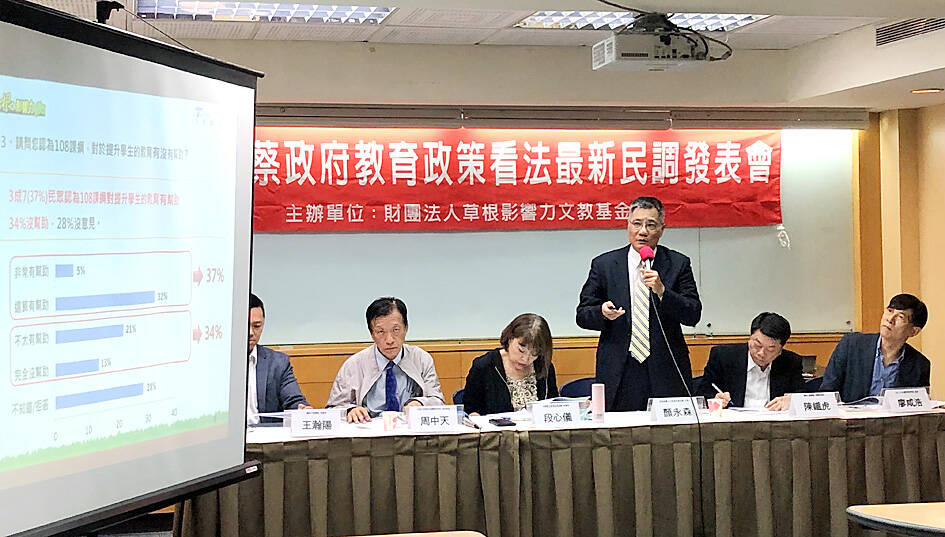The bid to turn Taiwan bilingual by 2030 could backfire and widen the English-language capability gap among students, telephone poll results showed on Friday.
The Grassroots Influence Foundation, which periodically conducts polls to determine public opinion on key government policies, said a majority of respondents expressed concern about the government’s Bilingual Nation 2030 campaign.
Sixty-two percent of the 1,111 respondents agreed when asked if they were worried the policy could lead to an “M-shaped” distribution with extreme high-performing and low-performing students in English, the foundation said.

Photo: Rachel Lin, Taipei Times
Twenty-nine percent rejected the premise, while 11 percent expressed no opinion in the survey conducted from May 29 to June 2, it said.
Under the government’s plan, schools in Taiwan at all levels are encouraged to expand English-language courses and programs.
The government has pledged to introduce English services in public facilities, as well as create an English-friendly environment nationwide.
However, 64 percent of respondents agreed that an increase in English-based courses is likely to make it more difficult for students to learn, and it could create more stress, the foundation said at a news conference.
English has been given an excessively high weighting in student’s studies, said Liao Hsien-hao (廖咸浩), dean of the Institute for Advanced Studies in the Humanities and Social Sciences at National Taiwan University.
Advances in translation technologies have effectively made the bilingual nation policy redundant, Liao said, adding that students should devote less time to learning foreign languages.
The survey, which targeted individuals aged 18 or older, had a margin of error of 2.9 percentage points.
A petition on the government’s Public Policy Online Participation Network Platform calling for the bilingual policy to be dropped received more than 10,000 signatures — double the threshold required for a formal response — within one week of posting on April 7.
The government has said it would officially respond to the petition on July 14.

Taipei has once again made it to the top 100 in Oxford Economics’ Global Cities Index 2025 report, moving up five places from last year to 60. The annual index, which was published last month, evaluated 1,000 of the most populated metropolises based on five indices — economics, human capital, quality of life, environment and governance. New York maintained its top spot this year, placing first in the economics index thanks to the strength of its vibrant financial industry and economic stability. Taipei ranked 263rd in economics, 44th in human capital, 15th in quality of life, 284th for environment and 75th in governance,

The Sports Administration yesterday demanded an apology from the national table tennis association for barring 17-year-old Yeh Yi-tian (葉伊恬) from competing in the upcoming World Table Tennis (WTT) United States Smash tournament in Las Vegas this July. The sports agency said in a statement that the Chinese Taipei Table Tennis Association (CTTTA) must explain to the public why it withdrew Yeh from the WTT tournament in Las Vegas. The sports agency said it contacted the association to express its disapproval of the decision-making process after receiving a complaint from Yeh’s coach, Chuang

Control Yuan Secretary-General Lee Chun-yi (李俊俋) tendered his resignation last night, admitting that he had misused a government vehicle, as reported by media. His resignation was immediately accepted by the Control Yuan. In a statement explaining why he had resigned, Lee apologized for using a Control Yuan vehicle to transport his dog to a pet grooming salon on May 20. The issue first came to light late last month, when TVBS News reported that Lee had instructed his driver to take the dog to the salon. The news channel broadcast photos that it said were taken by an unnamed whistle-blower, which purportedly showed the

The New Taipei City Government would assist relatives of those killed or injured in last month’s car-ramming incident in Sansia District (三峽) to secure compensation, Mayor Hou You-yi (侯友宜) said yesterday, two days after the driver died in a hospital. “The city government will do its best to help the relatives of the car crash incident seek compensation,” Hou said. The mayor also said that the city’s Legal Affairs, Education and Social Welfare departments have established a joint mechanism to “provide coordinated assistance” to victims and their families. Three people were killed and 12 injured when a car plowed into schoolchildren and their